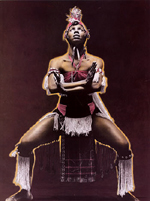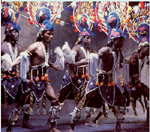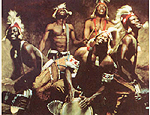|
Tourism:
|
Guinea is a country that has shaped history while conserving its distinctions. Intersection of civilizations of the
African Middle Ages, the country was the center of birth, the extension, and the successions of the grand West African
empires.
It is blessed with rich soil and is the water tower of West Africa because of its natural water capacity. Guinea
possesses an immense touristic potential. C. Ceriser identified it in 1890 as "The promised land of Africa." And the
Comte de Sanderval, French explorer describes Guinea as follows, "Country of rivers. I was taken by your brilliant
clouds, ribbons that cut across cotton, your immense green spaces, so powerful and not hostile. I climbed your
welcoming mountains and looked at your grand rivers populated with alligators. I penetrated your smothering forests.
Where sacred dancing finds its frenzy, elsewhere still, I encountered your handsome robed men overseeing their herds.
And above all, I saw lightning and the thunder and the gray curtain of rain tumble."
From the coasts sprinkled with splendid beaches to the luxurious forest region to the rich and varied folklore of
the gam-filled savannas of Upper Guinea across the Djolibu (Niger River) from fifteenth century fortresses to the
magnificent countryside of the Futa Djallon with its micro- climate, Guinea is a country that synthesized West Africa.
Guinea, rich in colors, in emotion, she is also in attractions. Fruits and vegetables ripen in the sun, without
chemical products. This natural and extremely varied and exceptionally charming heritage adds an important artistic
and cultural richness: the authenticity of different cultures with their songs, dances and traditions, the rich
artisanal patrimony, etc.
|
|

Ballet
©2001: Tourist Office
|

Dancers
©2002: Tourist Office
|

Dancers
©2002: Tourist Office
|
|
The Sossobala (sacred balafon) of Medieval Guinea of the 10th century) and warm blooded frogs unique to Mount Nimba
(the highest summit of West Africa) are part of the world's heritage. Guinea is also the capital of drumming and
percussion. In all of this, it is necessary to add the smile, the smile of welcome and hope of the Guinea (children,
women an d men). this is guinea! Travel Agencies already selling the destination's Touristic attractions offer the
opportunity to tour the country and go into provincial Guinea.
Chain hotels (Novotel, Meridien, SA Brussels Airways) and private hotels offer quality services in the capital city
of Conakry and in many cities in the country. Guinea has got a rich fauna and potential that has promoted game hunting
and fishing.
Guinea is also the revisited historical past and one of the great memories of Africa. It revives the heartstrings of
the slave trade through its renowned and dreary slave routes as well as the vestiges of the resistance to colonial
penetration. Guinea is still unknown to the majority of people for historic reasons; she has not sought to sell her
attractions until recently: is this a chance to better conserve the country's heritage and protect the environment,
the condition necessary for authentic tourism, adored by the majority of visitors? In any case, the data clearly
demonstrates that nature and hospitality can be exploited with method and talent. To arrive there, one needs a vision
that surpasses and largely, only investment and shapes the politics of tourism that is a goods fit in adhering the
population to project that concern the environment and also succeed in having tourism contribute to economic and
social development.
Last update: 25 April 2008
|

